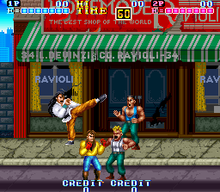| This article needs additional citations for verification. Please help improve this article by adding citations to reliable sources. Unsourced material may be challenged and removed. Find sources: "Gang Wars" video game – news · newspapers · books · scholar · JSTOR (September 2009) (Learn how and when to remove this message) |
| Gang Wars | |
|---|---|
 Japanese arcade flyer of Gang Wars. Notice that Jackie (left) resembles Jackie Chan. Japanese arcade flyer of Gang Wars. Notice that Jackie (left) resembles Jackie Chan. | |
| Developer(s) | Alpha Denshi |
| Publisher(s) | |
| Designer(s) | Tsutomu Maruyama (producer, director, designer) |
| Composer(s) | Yuka Watanabe Hiroaki Shimizu |
| Platform(s) | Arcade, PlayStation Network |
| Release | July 1989 |
| Genre(s) | 2D Beat 'em up |
| Mode(s) | Single-player, multiplayer |
Gang Wars (ギャングウォーズ) is a 1989 2D beat 'em up arcade game developed by Alpha Denshi and published by SNK.
Plot
The setting takes place in New York City, following martial artists Mike and Jackie, who heard an evil gang led by the antagonist, Jaguar, are terrorizing the city. Jaguar also kidnapped a young woman named Cynthia. Mike and Jackie must fight through parts of New York City (including Chinatown, Manhattan) to return peace to New York City, and defeat Jaguar to save Cynthia.
Gameplay

In Gang Wars, up to two players can control two different characters with different fighting styles. The movements are composed of two attack types—punch and kick—to fight against enemies, plus jumping to overcome obstacles. Players have access to a repertoire of techniques by pushing these buttons individually or in combination. The characters can also pick up weapons for hitting, throwing projectiles and firearms. At the end of each stage the players can customise the characters' three fighting statistics (Power, Speed and Guard) depending on the number of points they have. Higher-end stage scores grant more customisation points.
Reception
In Japan, Game Machine listed Gang Wars on their July 15, 1989, issue as being the third-most-successful table arcade unit of the month, outperforming titles like Golden Axe.
See also
References
- ^ Closing credits of Gang War. Retrieved on 09-23-2009.
- "Game Machine's Best Hit Games 25 - テーブル型TVゲーム機 (Table Videos)". Game Machine (in Japanese). No. 360. Amusement Press, Inc. 15 July 1989. p. 33.
External links
- Gang Wars at Arcade Database
- Gang Wars at the Killer List of Videogames
- Gang Wars at arcade-history